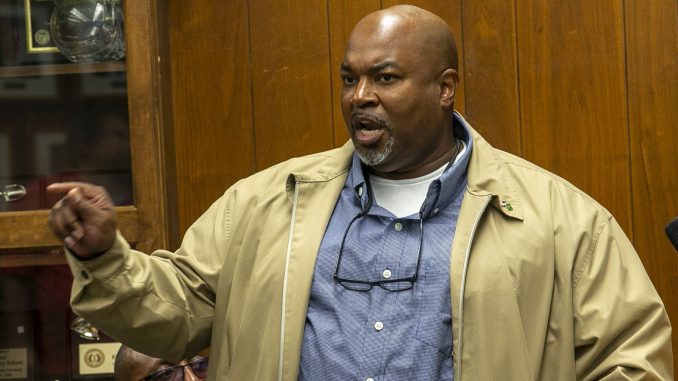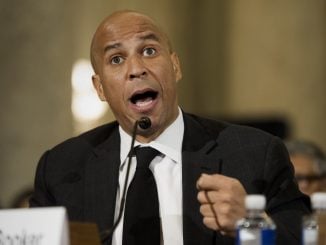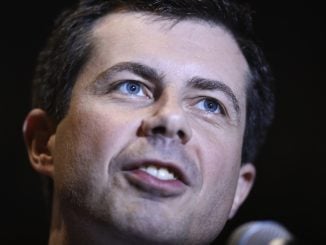
RALEIGH — Mark Robinson’s impassioned defense of gun rights to a North Carolina city council that went viral has catapulted the former furniture factory worker to the Republican nomination for lieutenant governor in less than two years.
Robinson, a first-time candidate, got the most votes among the nine-person field in Tuesday’s primary. Unofficial results show his 32.5% total more than doubled second-place finisher Andy Wells and exceeded the 30% threshold to avoid a runoff.
Several rivals outraised Robinson, who would be the first African American in the job if he wins in November. His grassroots efforts originating from a social media buzz won out.
“Right now it really doesn’t seem real,” Robinson said in an interview with The Associated Press on Thursday. “It’s my first foray into this. It’s been sort of surreal and I can just be as tickled as I can be.”
Robinson, who lives and was raised in Greensboro, spoke in April 2018 to his city council as it took comments on gun violence. The issue had gotten attention after the school shootings in Parkland, Florida, and attempts by some Greensboro leaders to cancel a local gun show.
In his four-minute speech, Robinson said he represented average folks in the community whose safety gets threatened when firearms restrictions get implemented. He said criminals won’t comply with those laws and will commit violence against people that do comply.
“I’ve heard a whole lot of people in here talking tonight about this group and that group,” Robinson said in the video. “What I want to know is when are you all going to start standing up for the majority? And here’s who the majority is. I’m the majority.”
These and other words lamenting the “demonizing” of police officers apparently struck a nerve once the video was distributed online by U.S. Rep. Mark Walker. Robinson’s campaign said it’s been viewed more than 150 million times. He became a TV show guest, speaker at gun rights rallies and now a board member of the National Rifle Association. The new career as a personality in the conservative movement prompted him to put on hold a teaching degree he was working on.
“Mark is a tireless advocate for freedom, the Constitution, and the right to self-defense who captured the hearts and minds of Americans across the country with his passionate defense of our Second Amendment,” NRA spokeswoman Amy Hunter said.
Robinson said he got in the race because he wanted to make a difference in North Carolina: “It’s about the opportunity … to make this state better.”
Robinson now awaits the outcome of the Democratic primary, where state Rep. Yvonne Holley of Raleigh got the most votes among the six candidates but failed to reach 30%. Holley, who is also black, and other rivals are pressuring second-place finisher Sen. Terry Van Duyn of Asheville not to seek a runoff. Holley also lagged in fundraising.
The general election winner succeeds GOP Lt. Gov. Dan Forest, who is running for governor.
Robinson emphasizes a platform to protect and expand school choice, oppose abortion and support law enforcement. There are few inherent powers that rest in the job. They include presiding over state Senate debate and serving on the State Board of Education and state community college board.
Robinson, 51, said he was politically minded growing up.
“We talked about what was fair and unfair and how it aligned with our Christian faith,” he said.
His interest grew when he read a Rush Limbaugh book almost 20 years ago.
Robinson’s campaign raised about $110,000 as of a few weeks ago, according to finance reports, and focused on social media. The GOP field included Wells, a state senator who loaned his campaign $500,000 for commercials, former U.S. Rep. Renee Ellmers and ex-state Rep. Scott Stone. Robinson acknowledged some mistakes in his campaign reports during the primary and said he’s hiring someone take over the work.
But money didn’t seem to matter in this primary race, said Scott Laster, a lobbyist and former Republican consultant.
“It was a dynamic personality that had a triggering event and just came out of nowhere to win that nomination,” Laster said. “He’s on the radar now.”



